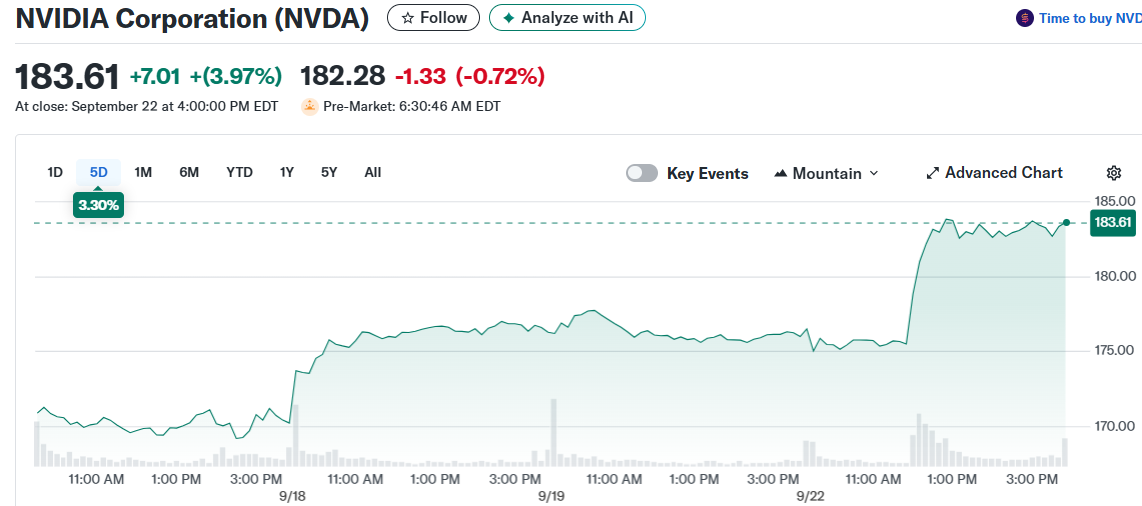TLDR
- Nvidia commits up to $100 billion investment in OpenAI for AI infrastructure development
- Partnership will deploy 10 gigawatts of Nvidia AI chips starting in second half of 2026
- Global semiconductor stocks surge following announcement, with TSMC up 3.5% and SK Hynix gaining 2.5%
- Deal addresses OpenAI’s massive computing needs while raising questions about chip allocation and competition
- Investment comes as part of broader AI infrastructure race worth hundreds of billions of dollars
Nvidia announced a massive $100 billion investment commitment to OpenAI, creating one of the largest technology partnerships in artificial intelligence history. The deal will provide OpenAI with critical computing infrastructure needed for next-generation AI development.

The partnership centers on deploying 10 gigawatts of power capacity using Nvidia’s advanced AI chips. This scale equals approximately 4-5 million graphics processing units according to Nvidia CEO Jensen Huang, who described the partnership as “monumental in size.”
Global semiconductor stocks rallied following the announcement. Taiwan Semiconductor Manufacturing Company, which produces chips for Nvidia, closed 3.5% higher. South Korean memory chip maker SK Hynix gained more than 2.5%, while Samsung rose 1.4%.
The initial $10 billion phase will use Nvidia’s next-generation Vera Rubin chips. Construction of the first gigawatt facility is scheduled to begin in the second half of 2026.
OpenAI CEO Sam Altman emphasized the importance of computing power for AI development. “Everything starts with compute,” Altman said. “Compute infrastructure will be the basis for the economy of the future.”
Funding Challenges Remain
The partnership addresses only part of OpenAI’s infrastructure needs. Industry estimates suggest each gigawatt of AI data center capacity costs approximately $50 billion to build, with $35 billion going to chip purchases.
Nvidia’s $10 billion per gigawatt commitment leaves OpenAI needing roughly $40 billion in additional funding for each planned facility. The company has not disclosed where it will secure the remaining capital.
OpenAI currently maintains a $500 billion valuation. Nvidia’s investment will be made at this valuation without receiving voting rights in the company.
The deal comes as OpenAI works to convert from its current non-profit structure to a for-profit public benefit corporation. This change requires approval from Delaware and California regulators.
Market Competition Effects
The investment raises questions about chip allocation in the competitive AI market. Nvidia could potentially prioritize chip deliveries to OpenAI while holding a financial stake in the company.
This arrangement may affect chip access for competitors like Anthropic or Google’s AI divisions. Advanced Micro Devices, which competes with Nvidia in AI chips, faces potential challenges in securing customers.
Oracle’s cloud computing business may benefit from the deal. The database company previously announced hundreds of billions in contracts with OpenAI and other AI companies. Nvidia’s investment could help OpenAI fulfill these commitments.
European chip stocks followed the positive trend. STMicroelectronics, Infineon, and BE Semiconductor all posted gains in early trading. However, equipment maker ASM International warned of weaker fourth-quarter revenue, weighing on some sector stocks.
The partnership represents the latest move in the AI infrastructure arms race. Technology companies are investing hundreds of billions in computing capacity to support increasingly demanding AI models.
Neither Nvidia nor OpenAI specified a timeline for completing the full 10 gigawatt deployment or the entire $100 billion investment. The companies plan to finalize partnership details in the coming months.





